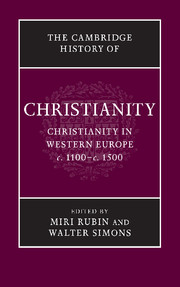Book contents
- Frontmatter
- Introduction
- PART I INSTITUTIONS AND CHANGE: 1100–1200
- 1 Clerical purity and the re-ordered world
- 2 The bishops of Rome, 1100–1300
- 3 Religious poverty and the search for perfection
- 4 Monastic and religious orders, c. 1100–c. 1350
- PART II FORGING A CHRISTIAN WORLD, 1200–1300
- PART III THE ERECTION OF BOUNDARIES
- PART IV SHAPES OF A CHRISTIAN WORLD
- PART V CHRISTIAN LIFE IN MOVEMENT
- PART VI THE CHALLENGES TO A CHRISTIAN SOCIETY
- PART VII REFORM AND RENEWAL
- Select bibliography
- Index
- Map 1 Western Europe c. 1100 – c. 1500
- Map 2 Universities of Europe
- References
3 - Religious poverty and the search for perfection
from PART I - INSTITUTIONS AND CHANGE: 1100–1200
Published online by Cambridge University Press: 28 March 2010
- Frontmatter
- Introduction
- PART I INSTITUTIONS AND CHANGE: 1100–1200
- 1 Clerical purity and the re-ordered world
- 2 The bishops of Rome, 1100–1300
- 3 Religious poverty and the search for perfection
- 4 Monastic and religious orders, c. 1100–c. 1350
- PART II FORGING A CHRISTIAN WORLD, 1200–1300
- PART III THE ERECTION OF BOUNDARIES
- PART IV SHAPES OF A CHRISTIAN WORLD
- PART V CHRISTIAN LIFE IN MOVEMENT
- PART VI THE CHALLENGES TO A CHRISTIAN SOCIETY
- PART VII REFORM AND RENEWAL
- Select bibliography
- Index
- Map 1 Western Europe c. 1100 – c. 1500
- Map 2 Universities of Europe
- References
Summary
‘Our order is abjection; it is humility; it is voluntary poverty, obedience, peace, joy in the Holy Spirit’, wrote the Cistercian abbot Bernard of Clairvaux (1090–1153) to the monks of St Jean d’Aulps who had affiliated with Cîteaux. Bernard further explained in a sermon that voluntary poverty, like the fortified city into which Jesus entered (Luke 10.38), defends its inhabitants from envy, within themselves and from others. Advising Atto, bishop of Troyes, Bernard asserted that, ‘The reward for poverty is the kingdom of heaven’. The search for the kingdom of heaven through the embrace of voluntary poverty animated not only the great abbot of Clairvaux, but many Christians from the regular and secular clergy as well as the laity throughout the twelfth century.
Poverty implied renunciation of the will as much as rejection of worldy goods. The Guta-Sintram codex depicts St Augustine under a banner reading, ‘Let poverty be sweet, the mind chaste, and the will one’. The same codex, the collaborative production of the canonesses of Schwartzenthann in Alsace and the canons of nearby Marbach, contains a sermon on Matt. 5.3, ‘Blessed are the poor in spirit’, composed by Peter Abelard for the nuns at the Abbey of the Paraclete. He admonishes them that, ‘those who imitate the apostolic life, renouncing the world utterly, are more authentically poor and closer to God’.
Keywords
- Type
- Chapter
- Information
- The Cambridge History of Christianity , pp. 39 - 53Publisher: Cambridge University PressPrint publication year: 2009
References
- 1
- Cited by

